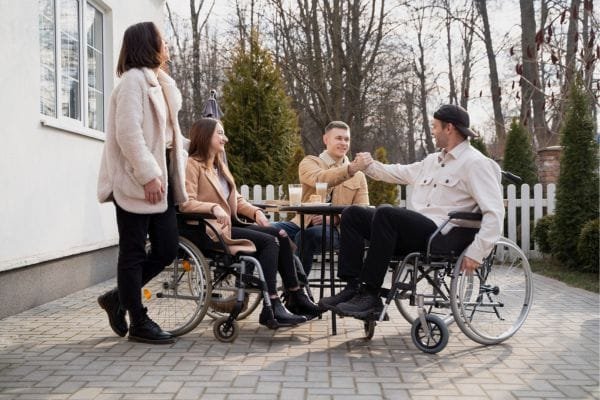Religions that support people with impairments and their families are known as churches that HELP with disabilities. This support can be obtained in various ways, including financial help, educational initiatives, and respite care. Churches likewise can provide a sense of community and belonging for individuals who have disabilities, who may likewise often feel isolated or marginalized.
Churches of many different kinds provide services for people with disabilities. Some churches have particular programs for people with disabilities, and others offer more preferred help. In addition to the National Association of Christian Churches for the Deaf, some churches are part of national organizations, while others are independent.
No matter what sort of Church it is, churches that help disabled individuals can play an important role in the lives of people with disabilities and their families. They can also offer much-needed resources, assistance, and a feeling of belonging and community.
To find out how to apply for disability aid from the Catholic Church, contact a Catholic Church workplace in your area and fill out an application after being informed of the process. They may be able to assist you.
READ MORE: Free Government Money For Seniors Over 60
Do Churches Help With Disabilities?
Churches have a long history of helping people with disabilities. In the early days of the Church, tians were sometimes the only ones who could provide food and lodging and help with medical expenditures for those with disabilities. Today, churches play a significant role in supporting those with severe impairments by offering a variety of services.
Additionally, churches frequently offer speech, occupational, and physical therapy services to those with impairments. These services can assist people in regaining their independence and simplifying daily life.

Additionally, churches may provide training and educational opportunities for those with impairments. These programs can assist individuals in developing their skills so they can participate in other activities or obtain employment.
Churches may provide a safe and encouraging space for those with disabilities to interact with others who understand their perspectives. Support groups can provide a sense of belonging, practical advice, and emotional support.
Churches may also provide transportation assistance to those with impairments. Humans may use this to attend important events like job interviews and medical visits.
Churches can provide accessible bathrooms and wheelchair ramps as accommodations for individuals with impairments. Because of these hotels, it can be easier for those with impairments to participate in church events.
Apart from those special programs, churches may also give people with disabilities a feeling of community and belonging. They may feel appreciated and at ease in churches, and they can also instill a feeling of optimism.
READ MORE: How to Get a Free Car for Veterans
List Of Churches That Help With Disabilities
Below is a list of churches that help with disabilities:
The United Methodist Church
The United Methodist Church (UMC) provides its members and the community with a wide range of disability support programs and services. These programs and services help people with disabilities lead fulfilling lives. Numerous UMC churches provide convenient worship services, which entails having various rooms, ramps, and elevators to make it easier for individuals with disabilities to participate in services.
Disability ministries in several UMC parishes provide resources and support to individuals with disabilities and their families. These ministries could provide support groups, social gatherings, and instruction for Sunday school. A few UMC churches offer respite care services for those who care for individuals with disabilities. For caregivers who require a break to rejuvenate, respite care can provide temporary respite.
People with disabilities can participate in employment training and placement programs, some UMC parishes offer. People with impairments can find and maintain employment with these services. People with impairments can receive transportation help from some UMC congregations.
The UMC is an excellent place to start if you’re trying to find a church that supports you or someone you know who has a handicap. Contact your local UMC church to learn more about its services and initiatives for people with disabilities.
READ MORE: Churches That Give Away Free Clothes Near Me
Presbyterian Church USA
In the United States, the Presbyterian Church (USA), sometimes known as PC (USA), is a mainstream Protestant denomination. With 8,700 churches and more than 1.1 million active supporters, it is the biggest Presbyterian denomination in the United States. Women and members of the LGBT community are ordained as elders and pastors, and the PC (USA) is renowned for its liberal philosophy.
The PC (USA) is governed by a General Assembly that convenes annually. Each congregation has a representation in the General Assembly, which unifies the denomination’s theology and regulations. Participants in the PC (USA) come from a wide range of backgrounds and denominations. The denomination is well-known for emphasizing environmental stewardship, social justice, and education. The PC (USA) also strongly supports lifestyle and the arts.
The Presbyterian Church (USA) provides its members and congregations various disability help programs and resources. The Presbyterian Church (USA) Board of Pensions provides disability benefits for qualified workers and retirees.
These benefits offer a monthly income and continued benefits if you cannot work due to illness or injury.
A Disability Inclusion Toolkit, provided by the Presbyterian Mission Agency’s Office of Christian Formation, offers suggestions for developing more inclusive worship and Christian formation programs for people with disabilities. Presbyterians dedicated to promoting, defending, and advancing the skills, rights, and obligations of men and women with disabilities in the broader church life are known as Presbyterians for Disability Concerns (PHEWA). PHEWA provides congregations and individuals with a wide range of resources and assistance.
If you’re a member of the Presbyterian Church (USA) and need assistance with a handicap, please contact your local congregation or the Presbyterian Mission Agency directly.
The Episcopal Church
One of the major Protestant denominations in the US and other countries is the Episcopal Church. It belongs to the worldwide Anglican Communion. Each of the nine provinces that make up the Episcopal Church has its own governing body. The General Convention, which convenes every three years, is the highest governing body of the Episcopal Church. Members of the Episcopal Church reflect a broad spectrum of theological perspectives, making it a diverse denomination.
While some Episcopalians are more liberal, others are more conservative. Nonetheless, the belief in Jesus Christ and the commitment to upholding his teachings bind all Episcopalians together. The Episcopal Church has a reputation for prioritizing social justice and has a long tradition of supporting the poor, the disenfranchised, and the downtrodden.
Similarly, the Episcopal Church seeks to advance global understanding and peace. Its network is hospitable and inclusive. Everyone is welcome to join in church activities, regardless of background. Helping those with disabilities is also a priority for the Episcopal Church.
The Episcopal Church provides numerous services and initiatives for people with disabilities. The Church Pension Group (CPF) provides active clergy contributors with short-term and long-term disability coverage. If a clergy member cannot work for a limited period due to an infection or accident, short-term disability benefits may be able to help replace lost income. If a clergy member cannot work for an extended length of time, long-term disability benefits may be able to help replace lost income.
The Episcopal Church Foundation provides disability offers to assist Episcopalians with disabilities with meeting the costs of essential needs, including housing, food, and transportation. Individuals and households with impairments, regardless of age or income, are eligible for grants. Additionally, the Episcopal Church Foundation provides funds for accessibility to support Episcopal congregations.
Ramps, elevators, accessible bathrooms, and other accessibility features can be purchased or installed with grants. Worship services, Bible study groups, and social events are just a few of the disability outreach activities and services offered by several Episcopal parishes. These services and initiatives can help people with disabilities form relationships and engage with their religious community.
There are several resources available that can assist you if you are an Episcopalian with a handicap or if you know someone who is. To find out more about disability ministry services and initiatives, you can get in direct contact with your local Episcopal church. To apply for a disability grant, you may also contact the Episcopal Church Foundation.
The Lutheran Church
The Lutheran Church is a varied denomination with many different theological viewpoints. While some Lutherans are more liberal, others are more traditional and conservative; all Lutherans share a commitment to the religion’s core tenets. Environmental sustainability and social justice are also priorities for the Lutheran Church.
Lutherans believe they must take care of the world God has made. The network of Lutheran churches is hospitable and inclusive. The Church provides a wide range of services and events for people of all ages and backgrounds, and it strongly supports people with disabilities.
A non-profit organization called the Lutheran Church Disability Assistance (LCDA) provides financial support to members of the Lutheran Church who have impairments. LCDA provides a wide range of services and initiatives. The cost of medications, medical therapy, and other health-related expenses can be covered by LCDA. LCDA can assist with mortgage payments, leasing fees, and other housing-related expenses.
The expense of transportation to and from doctor’s visits, job interviews, and other necessary activities can be covered by LCDA. Lessons, books, and other educational costs can be covered by LCDA.
LCDA can cover the cost of job training programs and other services that can help persons with disabilities find and keep jobs. To help people with disabilities lead full and productive lives, LCDA also provides a variety of advocacy and support services. LCDA can help those with disabilities find resources in their neighborhood, make connections with other disabled individuals, and fight for their rights.
You must be a Lutheran Church member with a handicap that satisfies LCDA’s qualifying requirements to apply for assistance. You may watch it by mail or on the Internet. After reviewing your application, LCDA will decide if you qualify for aid. LCDA will provide you with a grant to help cover your costs if you are accepted for their assistance.
The Catholic Church
With more than 1.3 billion followers, the Catholic Church is the most significant Christian denomination in the world. It has existed since the beginning of Christianity. The Church has greatly influenced Western culture, and this impact can be observed in many aspects of daily life, such as literature, music, and art.
The Catholic Church has a long tradition of offering direct assistance to those with disabilities and provides a wide range of services and initiatives for them. Through its network of schools, the Catholic Church assists those with disabilities in one of the most significant ways. A few Catholic colleges and companies offer programs for disability research and rehabilitation, and many Catholic workplaces provide various educational opportunities for college-aged children with impairments.
The Catholic Church offers services such as support groups, housing aid, and job education. It also seeks to increase public awareness of disability issues and advocate for the rights of those with disabilities.
Churches That Help With Disabilities Near Me
You may do several things if you’re looking for churches that can help you or someone with a handicap. First, get advice from your doctor, family, or friends. Similarly, you may look for churches that provide services for those with disabilities online. Visit the churches you’ve found and choose the one that seems like the best fit for you.
It is important to remember that each Church is unique. Additionally, particular churches may offer more comprehensive services and programs for those with disabilities than others. Finding a church that could suit you or the person you’re helping is also essential. Think about the Church’s size, location, ambiance, and the programs and services it offers. Finding a church that can provide the assistance and support you or someone you know needs may be accomplished with a little investigation.
Bottom Line
People with disabilities can benefit greatly from the assistance and services provided by churches that provide disability services. Numerous ministries and activities offered by churches may be specifically tailored to meet the needs of people with disabilities. These programs may include social gatherings, support groups, religious services, and Sunday faculty sessions.
Additionally, churches can offer practical assistance to people with disabilities, such as transportation to and from services, aid with daily tasks, and respite care for caregivers. Establishing a friendly and inclusive environment is one of the most essential things churches can do for those with disabilities. This ensures that every member of the congregation, regardless of their skill level, is recognized and cherished.
Churches can also be involved in addressing disability issues and fighting for the rights of those with disabilities. In addition to churches that support people with disabilities, some churches also help those dealing with mental health issues, including depression and drug addiction.



